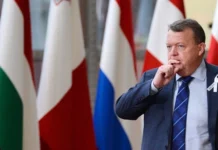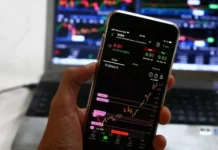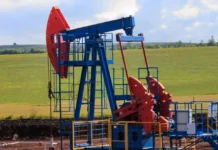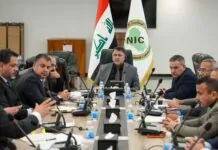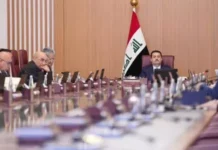A Government Initiative To Diversify The Economy And Boost Investment Confidence.
Economic 08/04/2025 Baghdad: Hussein Thaghab Throughout history, gold has maintained a cultural symbolism and enduring economic value.
To leverage this status for the benefit of the national economy, Prime Minister Mohammed Shia al-Sudani launched an initiative to transform Baghdad into a regional center for the gold and jewelry industry and trade.
The initiative, approved by the Ministerial Council for the Economy, aims to
capitalize on Iraq’s natural resources in gold and precious metals,
regulate the local market,
attract investment, and
build value chains within the country.
Strategic Move
In this regard, economic and banking expert Dr. Nabil Rahim Al-Abadi explains that amid accelerating global economic fluctuations, demand for gold as a safe haven has surged.
He explains that Prime Minister Mohammed Shia Al-Sudani’s initiative to
open the door to gold investment with strong government support and guarantees
underscores the government’s strategic direction to keep pace with global trends.
Al-Abadi added, in an interview with Al-Sabah, that
gold is not just a valuable commodity,
but has turned into a major investment tool in the portfolios of
financial institutions and individuals alike,
especially with expectations of its price rising to $3,500 per ounce by the end of this year, according to reports from Goldman Sachs Bank. He pointed out that
Investor Confidence
global markets are witnessing a fundamental shift in dealing with the “yellow metal,”
especially with the rise in inflation and the decline in investor confidence in traditional currencies.
He emphasized that during major crises, such as the Corona pandemic and the Russian-Ukrainian war, the price of gold rose by percentages ranging between (19-24)%, which strengthened its position as one of the most important hedging tools against economic risks.
Successful Experiences
He said that leading experts, such as Peter Schiff of Europak, have warned that the world is facing the largest wave of inflation in modern history, which has prompted central banks around the world to increase their gold reserves.
He pointed out that the most successful model that Iraq can adopt is the system of gold exchange-traded funds (ETFs), which provide high liquidity and significantly reduce storage and insurance costs.
The Gold Shares Fund, for example, is the largest gold fund in the world, managing assets amounting to hundreds of billions of dollars, making it an ideal model that can be applied to the Iraqi market. He added that
Golden Certificates
it is also possible to benefit from the experience of gold certificates offered by banks such as
Banque Misr and Mashreq Bank, which allow investors to own gold without the need to store it physically, with full guarantees from the Central Bank, adding that
there is a digital gold model, launched by Saudi banks such as Al Rajhi, which allows the buying and selling of gold with a minimum of (10) grams via phone applications, making it accessible to small investors.
Strict Regulatory Framework
When asked how Iraq could transform gold into an economic engine,
the economist and banking expert explained that for the initiative to succeed, a
strict regulatory framework must be established, including the
establishment of an independent oversight body to oversee the quality of gold in circulation and the
adoption of a transparent pricing mechanism that reflects global prices.
Banking Infrastructure
He emphasized the importance of developing an integrated banking infrastructure, including
digital platforms for the immediate buying and selling of gold, along with
tax exemptions to encourage storing gold in bank vaults rather than at home.
He also proposed providing low-interest gold-backed loans, allowing business people to benefit from price fluctuations without significant financial risk.
He also emphasized the importance of building central vaults secured according to global security standards, which would be a crucial step in ensuring investor confidence.
Challenges And Risks
Al-Abadi believes that there are challenges that cannot be ignored, most notably:
price fluctuations, as the difference between the buying and selling price may reach (15%) in some unregulated markets, which requires imposing a regulatory ceiling not exceeding (1.5%),
in addition to the risks of home storage, which increases the possibility of theft,
which requires incentives to encourage storage in bank vaults.
He also believes that the trading of fake gold is a constant risk in emerging markets, and
requires obligating banks to issue guarantee certificates of purity. He noted that
Gradual Strategy
Iraq could become a major player in the regional gold market if it follows a gradual strategy, starting with building the necessary infrastructure within six months, then launching digital platforms and certificates of deposit within a year, and finally linking the local market to global gold exchanges within three years.
He noted that the success of this initiative will depend not only on government support, but also on tripartite cooperation between the government as a guarantor, banks as a carrier, and investors as a key driver.
In times of crisis, gold becomes a currency of trust that can contribute to strengthening the Iraqi economy and integrating it into the global market with steady steps, rather than just being an investment.
Fundamental Reforms
For his part, economic expert Asaad Al-Rubaie said:
“The current government has launched a series of steps to diversify financial revenues away from oil by implementing a package of fundamental reforms
targeting non-oil revenues, including
reforming the tax system by expanding the tax base,
automating collection,
combating tax evasion,
supporting the private sector, and
establishing strategic projects such as
petrochemical plants and
paving and expanding strategic roads,
which represent a very important part of the success of any economic renaissance.”
He indicated that the recent approval by the Ministerial Council for the Economy to establish the International Gold City in Baghdad comes in line with the objectives of the government program to support industrial development and provide job opportunities.
Diversifying The Economy
Al-Rubaie, speaking to Al-Sabah, considered launching such an initiative to localize the gold industry an important tributary to diversifying the economy away from oil, adding an important and strong pillar to the Iraqi economy and consolidating Iraq’s economic position on the global map.
It may be the first step in presenting Baghdad as a regional economic center,
representing an excellent destination for global capital to invest in, and
offering it as a competitor to other countries and cities such as Dubai, Istanbul, and others.
Integrated City
Al-Rubaie explained that the project aims to launch an integrated city with international standards for the gold industry, including
units for gold and jewelry crafting,
training and qualification centers for national cadres, and
advanced markets and a
stock exchange for gold trading.
He described the initiative as reflecting a significant economic transformation aimed at localizing the gold industry and creating jobs, while supporting the private sector and enabling it to play a greater role in the national economy.
City of Gold
He added that Baghdad will have a strong influence and presence in the gold sector.
In the year (2023), the Iraqi gold stock reached (145) tons, according to data from the World Gold Council.
The country ranked
first in the Arab world and
seventh globally among the central banks that bought the most gold last year. He pointed out that
the city of gold makes Baghdad an integrated regional hub that brings together manufacturing,
training, marketing and trading in an integrated environment,and presents Baghdad as a regional competitor for the gold industry and its formulation. And re-export it. https://alsabaah.iq/118479-.html
Al-Sudani’s Advisor To The Iraq Observer: The Three-Year Budget Has Given Iraq Financial Stability And Salaries Are Continuing.
August 2, 2025 Baghdad/Iraq Observer The Prime Minister’s financial advisor, Mazhar Mohammed Salih, confirmed that the three-year budget has provided Iraq with financial stability despite the delay in the 2025 budget schedule, while noting that salaries are continuing to be paid. In a statement to Iraq Observer, Saleh said,
“The Triennial Federal Budget Law No. 13 of 2023 represents a qualitative shift in financial planning in Iraq, as it is the first legislative experiment of its kind in the country, enabling the executive and legislative authorities to manage public expenditures with unprecedented flexibility. He noted that
these expenditures constitute approximately 50% of the gross domestic product, and we might as well therefore represent the cornerstone of the overall demand of the Iraqi economy.” He explained that
“this experiment was based on the amended Federal Financial Management Law No. 6 of 2019,
which, for the first time, authorized the enactment of a budget for three consecutive years. He indicated that
this step gave the government the ability to implement operational and investment budgets within a stable financial plan, without delaying the 2025 budget schedules causing a significant disruption to the state’s financial life, particularly with regard to salaries, social care, and deficit financing.”
According to the Prime Minister’s advisor, “The House of Representatives added a new legal provision (Article 77/Second) to the three-year budget, requiring the executive authority to submit an annual financial position for the following two years (2024 and 2025), including detailed tables of
expected revenues,
public expenditures, the
planned deficit, and its
funding sources, as
a precautionary measure to address
external economic shocks and
unexpected changes.”
He pointed out that “the delay in submitting the 2025 schedules is due to technical and structural reasons, most notably the fundamental amendment to the budget in February 2025 related to the evaluation of contracts for the costs of producing and transporting Kurdistan Region oil with the aim of implementing the region’s share in the general budget, in addition to the sharp geopolitical fluctuations in global energy markets, the decisions of OPEC+, and the subsequent direct repercussions on the estimation of Iraq’s oil revenues.”
Despite these challenges, Saleh affirmed that “direct coordination between the executive and legislative authorities has continued uninterrupted, particularly on revenue and expenditure governance, deficit management, and financing. He noted that
there are outstanding financial rights for various functional and societal segments that are still awaiting approval of the financial tables for the 2025 budget, and that he expects these to be approved soon as part of the existing legislative procedures.”
Saleh concluded his statement by emphasizing that “the flexibility provided by the three-year budget and the Financial Management Law has contributed to maintaining the country’s financial stability, despite the delays in some implementation procedures.”
He emphasized that the government is proceeding with the completion of the budget requirements in cooperation with the House of Representatives, to ensure the sustainability of public spending and the provision of development requirements and basic services to citizens. https://observeriraq.net/مستشار-السوداني-الموازنة-الثلاثية-من/
For current and reliable Iraqi news please visit: https://www.bondladyscorner.com

